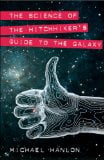 The Science of “The Hitchhiker’s Guide to the Galaxy”
The Science of “The Hitchhiker’s Guide to the Galaxy”
by Michael Hanlon
Palgrave Macmillan, £16.99, ISBN 1403945772
I approached this book with trepidation, not being a Guide fan. I heard none of the radio programmes, have read none of the books, and haven’t seen the film, though I saw some of the television series. But the title is misleading: it isn’t about the Guide, contains little about it, and you don’t need to be a fan to understand it. It is an excellent discussion of many topics raised by the Guide by the Science Editor of the Daily Mail, previously noted for debunking ‘alternative medicine’.
Hanlon leads us on a lively romp through aliens (where are they? – Roswell is “barely even worth a mention”, but he gives the solution to Rendlesham, with apt comment on people’s tendency to see what they expect to see); arguments for the existence of God; the end of the universe; the big bang; time travel; machine translation; teleportation; other worlds; and the interesting fact that if you Google ‘answer to life, the universe and everything’, you get 42 (I tried it and it’s true). The best parts are, first, Hanlon’s withering scorn for the “drivel” (a good example of his robust style) that conscious machines are around the corner. When the film 2001: A Space Odyssey was made in the mid-1960s, it was indeed seriously predicted that we would be talking to computers in a way almost indistinguishable from a conversation with a real person by, well, 2001. As you’ve probably noticed, it didn’t happen, and still hasn’t. (Another example of his style is the wonderful sentence: “Buses occupy a parallel universe that almost but never quite coincides with your own.”) Second, his discussion of people’s misunderstanding of the laws of chance, with surveys showing that people think that vanishingly tiny risks like nuclear power and air and rail travel are more significant than truly risky activities like riding a bicycle, driving and smoking (driving to the airport is vastly more dangerous than the flight). Drive your children to school and you will protect them from assault, abduction etc. But the chances of a child dying in a motor accident are at least 100 times greater than of being murdered by a stranger, so in driving your children to school you are actually exposing them to far greater danger than if they walked.
This is an excellent book exploring fundamentally serious matters in a most entertaining way. Rather a shame that many people will ignore it because they think it’s about the Guide!
Ray Ward

